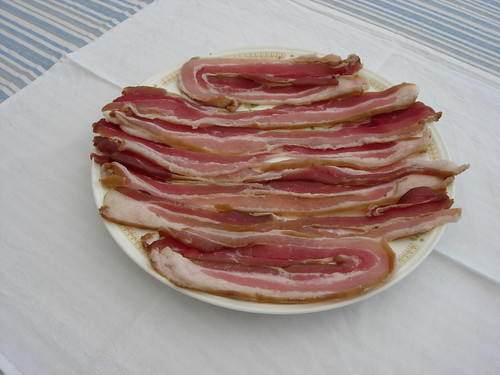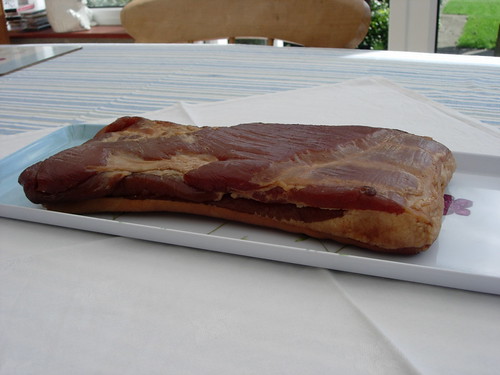Crispybacon wrote:... I can get something called �flossy salt� : -
http://www.wasalt.com.au/Flossy.html�..from the same place I got my saltpetre. From the supermarket I can get non-iodized table salt but it does have anti-caking agents in it. I�ll probably go with this for the time being until I can get some of the other.
The flossy salt looks to be a very useful product, with medium coarse crystals.
I note that that particular company uses an anti-cakeing agent that is different to that commonly used in the UK - and at a rather higher level. However, it may be possible that it has less taste impact that way. Or not. Dunno, sorry.
But I'm flagging up that that suppliers "Iodised Table Salt" contains 7,500ppm of anti cake Sodium Silico Aluminate, and only 70ppm of Iodate. I know which I'd expect to be most significant...
You are only going to be introducing 20g of salt (absolute maximum) into your 1 kg of bacon. So that is 20 x 70 millionths of a gram, less than one and a half thousandths of a gram, of Iodate in total in the kilo of bacon. Honestly, I don't believe Iodine levels should be a concern. But I would be concerned about the much larger amount of anti cake.
Which leaves the problem of accurately measuring out tiny quantities of saltpetre. Rather than buying some specialist scales, I've taken to using a standard solution of saltpetre, so that I can measure out 20g or so of solution rather than weighing 0.4g or somesuch.
20cc of solution is also much more easily evenly spread over the whole meat surface than 0.4g of crystals...
Are you saying that you dissolve for example 5g of saltpetre in 200g of water and then just measure out the 20g of the solution for your kilogram of meat?
Yes, that makes for an accurate way of measuring your 0.5g of saltpetre.
The application of this perfectly conventional idea, from (school-level) practical chemistry, to meat curing seems (amazingly) to be my own idea.
You are increasing your measurement accuracy dramatically by taking a more easily measurable (larger) quantity of saltpetre, diluting it, and then measuring a more easily measurable (larger) quantity of the solution.
However, if your scale only measures in 5g 'clicks', its unsuitable for measuring a 5g quantity. You'd be better either mixing up 20g of saltpetre in 800 ml of boiled water, or taking the 20g and then halving, and halving again, by eye, to get the 5g.
If your scale is �2.5g, your % accuracy is rubbish at 5 �2.5 and rather more respectable at 20 �2.5
That said, I'm wondering about getting a 'pocket' digital scale with 0.1 or 0.01g 'clicks'. My guess is that street corner 'businessmen' might be the target market for such items, but whatever, they do exist, and quite cheaply.
If you want your bacon really dry, hang it in the fridge. It'll dry and firm up considerably in a couple of days.
The only reason I wanted to do dry-cure bacon was from all I�ve seen and heard on television etc. it seems to be regarded as superior to the brine cure. I guess the very fact that I�ll be making my own as opposed to buying the �pumped full of whatever� bacon makes anything I produce superior regardless of how it�s done.
The salt (and saltpetre) need some water to dissolve it and so allow it to be transported into the meat. Adding 2% water actually facillitates this, and helps provide a kick start.
Check the bacon weight yourself. After curing, it won't have gained weight. However, if you immersed it in brine, it'd be expected to gain 5 to 10% weight from brine uptake (if you left it long enough). Commercial bacon in the UK with "no added water" may legally have been pumped with 10% of brine...

By giving it 2% water (or so) you are much closer to a "dry cure" than almost anything you are likely to buy.
Traditionally, curing was about preservation, which meant getting salt in and water out. Now its a different game, played for taste and texture. Seriously dry and seriously salty bacon isn't as nice as something that isn't so extreme.
In your sealed vacpack, after a day or so, you'll have some salt inside the bacon, rather more in the brine, and maybe a few crystals still undissolved.
If you pour off the 'juice', you'll be pouring away much of the salts. Its a matter of just how salty you like your bacon as to how long you leave it!
You can soak out excess salt by leaving the bacon in fresh water for hours to days. But note that if you hang the bacon and dry it, the drying ups the saltiness...
The vacuum speeds the curing process. I just use a Ziploc bag.
Would you recommend that I check my fridge temperature before attempting this. Also is there a danger in leaving the bacon to cure any longer than the time recommended in Oddley�s recipe? Is there any way to tell if it�s working��.like with colour changes etc.? I know fridge temperature can affect the rate at which the saltpetre converts from nitrate to nitrite.
Yes. Saltpetre curing depends on bacterial action, and that depends on temperature. You don't want the fridge too cold - and +2C is too cold. I used an ordinary digital room thermometer to discover that the top shelf of my fridge is usually around 6C while the fridge floor stays close to 2C. Your mileage may vary. I try and use the top shelf to have the higher temperature. Just use the warmest part of your fridge.
As to knowing when its done, try poking it! The curing firms up and stiffens the meat somewhat, and while you won't initially recognise any 'right' feel, you should be able to develop that knack. But to start with, follow recipe times until you know better!
Its a pretty easy process. Much of the difference in the advice handed around is because the process allows so much variation - and within that you can adjust things to suit your own taste.
IMHO, the main risk is that your meat will be too sterile and the bacteria won't be there to work with the saltpetre. Then you'll end up with pallid salt pork rather than bacon. Not much of a risk, really.
Have a go, note what you do, and tweak it the next time depending on how it turns out.
Just do it, and I'm sure you'll make something good!






